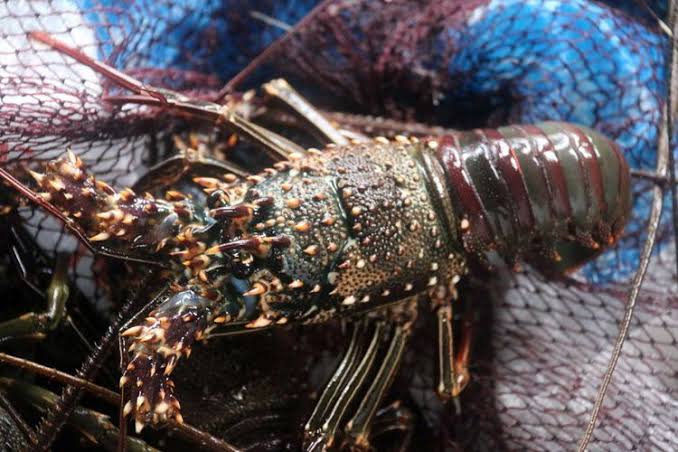Being preoccupied by issues of pandemic, global elite conspiracies, YouTube prank, and maritime slavery, millions of Indonesians are not even aware that lobster from Indonesia has been legalized for export.
After lengthy discussions with various parties, the Minister of Maritime Affairs and Fisheries Edhy Prabowo finally enacted the minister’s regulation on Wednesday, May 6, 2020.
The Minister of Maritime Affairs and Fisheries (KP) Regulation No. 12 of 2020 concerning the management of lobster and crabs, has officially replaced the KP Regulation No. 56 of 2016 enacted by former minister, Susi Pujiastuti.
Although Edhy Prabowo and Susi Pujiastuti had a dispute regarding the legality of lobster exports at the end of 2019, I think this situation will improve because the new regulations that have been released by Edhy Prabowo seems a wise policy in dealing with the problems and feuds.
Although the Gerindra party politician legalizes lobster for exports, both in terms of consumption and seeds, it does not necessarily rule out the rejection conveyed by various parties, especially Susi Pujiastuti.
At that time, the entrepreneur and former KKP leader had rejected the lobster export discourse presented by the new KKP leader. Because, according to her, maintaining the balance of the lobster population in the country is a more important discourse, rather than having to comply with world’s market demand.
“After all, when it is in consumption size, lobster will also be sold to Indonesia,” more or so in her mind.
What was the concern of Susi Pujiastuti was also my concern at that time because for lobster there is no cultivation technology. Even if there is, it is just an enlargement technology, like what Vietnam has today. But for spawning or breeding technology, it has not been found for lobsters. Thus, the lobster population in nature is very vulnerable for excessive exploitation.
The new regulation is good news to various lobster entrepreneurs. Small fishermen, are likely to be very grateful because they can find more lobster seeds in the sea. Whereas the lobster exporter businessman certainly smiles because they can send more lobsters abroad.
I will summarize the contents of Permen KP No. 12 of 2020, until I can conclude that the contents of the new regulation are truly wise in dealing with the situation.
In the regulation, it is stated that to catch lobster seeds, must be in accordance with the specified quota and location. Then catching the seeds must also be done only by registered small fishermen. It certainly aims to limit the number of fishermen and avoid over-exploitation of lobster catching.
Furthermore, the fishing gear used must also be static or passive. So fishermen are prohibited from catching lobster seeds using trawlers mounted on the ship and pulled away.
Then, lobster seeds that have been captured will go to 2 sectors, cultivation or direct export. The seeds will be cultivated first, the location of the cultivation must also be in accordance with government regulations. Then if it is harvested, farmers must release the lobster back to nature as much as 2% of the total harvest. And the release is also done at the same place of seed collection.
That is the reason why fishermen must be registered, so the origin of the seeds is clear and the demand to release some harvest is a very wise regulation. Because the wishes of those who opposed were met as well, the restoration of ecosystems and the restoration of lobster populations in nature.
Export activities are also regulated in the regulation, the export quota determined periodically depending on domestic stock, it is designated to only a few airports as the main exit for lobsters, and exporters must be officially registered.
And what I support the most from the new regulation is that Article 5 states that exporters must carry out cultivation activities as well. Where the exporter has managed to harvest sustainably and has released lobster as much as 2% of the harvest. So with regulations like that, exporters also contribute to stabilizing the lobster population in nature, not just exploiting it.
In article 5, it is also explained that the lowest price of lobster seeds from fishermen, becomes the benchmark for the price of lobsters that are exported. So that the price of lobster on the market is not too expensive than the price of fishermen, so that fishermen are not at disadvantaged.
Those are some of the new regulations from Edhy Prabowo. Although the contents of the regulations also discuss regulations related to crabs, I will prioritize lobster because it has been widely discussed by the public. Hopefully it can be applied fairly and sustainably. Considering that Indonesia is a maritime country that should be independent with its potential.
Also, hopefully we will not forget the consequences that have been written for those who break the rules. Where violators will be subject to written warning, stopped activities, sealing, frozen licenses, and administrative fines.
Pak Edy was satisfied by meeting market demand, Bu Susi was pleased that the lobster population could be stable. Will it be like that? Let’s see what’s next.
For all fisheries academics, please quickly find a way to spawn lobster as the best industry is of the ability to be independent.
Author: Bastian Ragas





